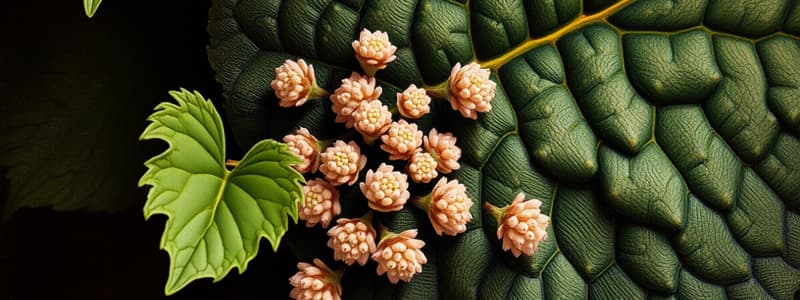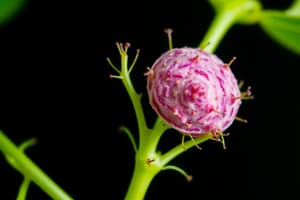Podcast
Questions and Answers
What type of permanent tissue is responsible for the transport of water and minerals in plants?
What type of permanent tissue is responsible for the transport of water and minerals in plants?
- Xylem (correct)
- Meristematic
- Collenchyma
- Phloem
Parenchyma is a complex permanent tissue.
Parenchyma is a complex permanent tissue.
False (B)
Name the three types of meristematic tissues.
Name the three types of meristematic tissues.
Apical Meristem, Intercalary Meristem, Lateral Meristem
Match the following tissues to their features:
Match the following tissues to their features:
Which component of xylem is responsible for providing structure?
Which component of xylem is responsible for providing structure?
________ is a type of permanent tissue that provides mechanical support and elasticity in plants.
________ is a type of permanent tissue that provides mechanical support and elasticity in plants.
Sclerenchyma is responsible for the storage of food.
Sclerenchyma is responsible for the storage of food.
What is the primary function of phloem?
What is the primary function of phloem?
Meristematic tissues are found in the ________ of plants.
Meristematic tissues are found in the ________ of plants.
Which of the following is NOT a type of simple permanent tissue?
Which of the following is NOT a type of simple permanent tissue?
Flashcards are hidden until you start studying
Study Notes
Tissues Overview
- A tissue is a group of similar cells working together for a specific function.
Plant Tissues
- Plant tissues provide structural support, differing from animal tissues due to plants' fixed habits.
Meristematic Tissues
- These tissues actively divide throughout a plant's life, located in growth regions like root and shoot tips.
- Meristematic tissues are living and contribute to the increase in plant length and girth.
Types of Meristematic Tissues
- Apical Meristem: Found at the tips of stems and roots, aiding in vertical growth.
- Intercalary Meristem: Located at the base of leaves or internodes, contributing to growth in length.
- Lateral Meristem: Found on the sides of stems and roots, responsible for growth in thickness.
Permanent Tissues
- Composed of cells that do not divide; possess permanent structure, size, and function.
- Formed from meristematic tissues after cell division stops.
Simple Permanent Tissues
- Comprised of one cell type.
- Parenchyma: Basic tissue, storage of food, provides support, characterized by thin-walled and loosely packed cells.
- Collenchyma: Living, elongated cells with thickened corners; found in leaf stalks, provides mechanical support and elasticity.
- Sclerenchyma: Thick-walled and lignified cells, offering strength and support under stress, present in stems and seeds.
Complex Permanent Tissues
- Made up of multiple cell types.
- Xylem: Vascular tissue responsible for water and mineral transport; known as wood.
- Phloem: Vascular tissue responsible for food transportation from leaves to other plant parts.
- Different Components of Xylem:*
- Tracheid: Long, narrow, dead cell facilitating water movement.
- Vessel: Wide, dead cell with sieve plates for efficient water passage.
- Xylem Fiber: Provides structural support, long and thick-walled.
- Components of Phloem:*
- Phloem Parenchyma: Living cells that store food.
- Companion Cell: Assists in regulating sieve tube function.
- Sieve Tube: Living cells for food transport, characterized by perforated end walls.
Features of Plant Tissues
| Tissue | Features |
|---|---|
| Parenchyma | Thin-walled, large vacuoles, loosely packed |
| Collenchyma | Elongated cells with thickened corners, provides support |
| Sclerenchyma | Thick-walled, lignin deposition, provides strength |
| Xylem | Dead cells, transports water and minerals |
| Phloem | Living cells, transports food |
Studying That Suits You
Use AI to generate personalized quizzes and flashcards to suit your learning preferences.




